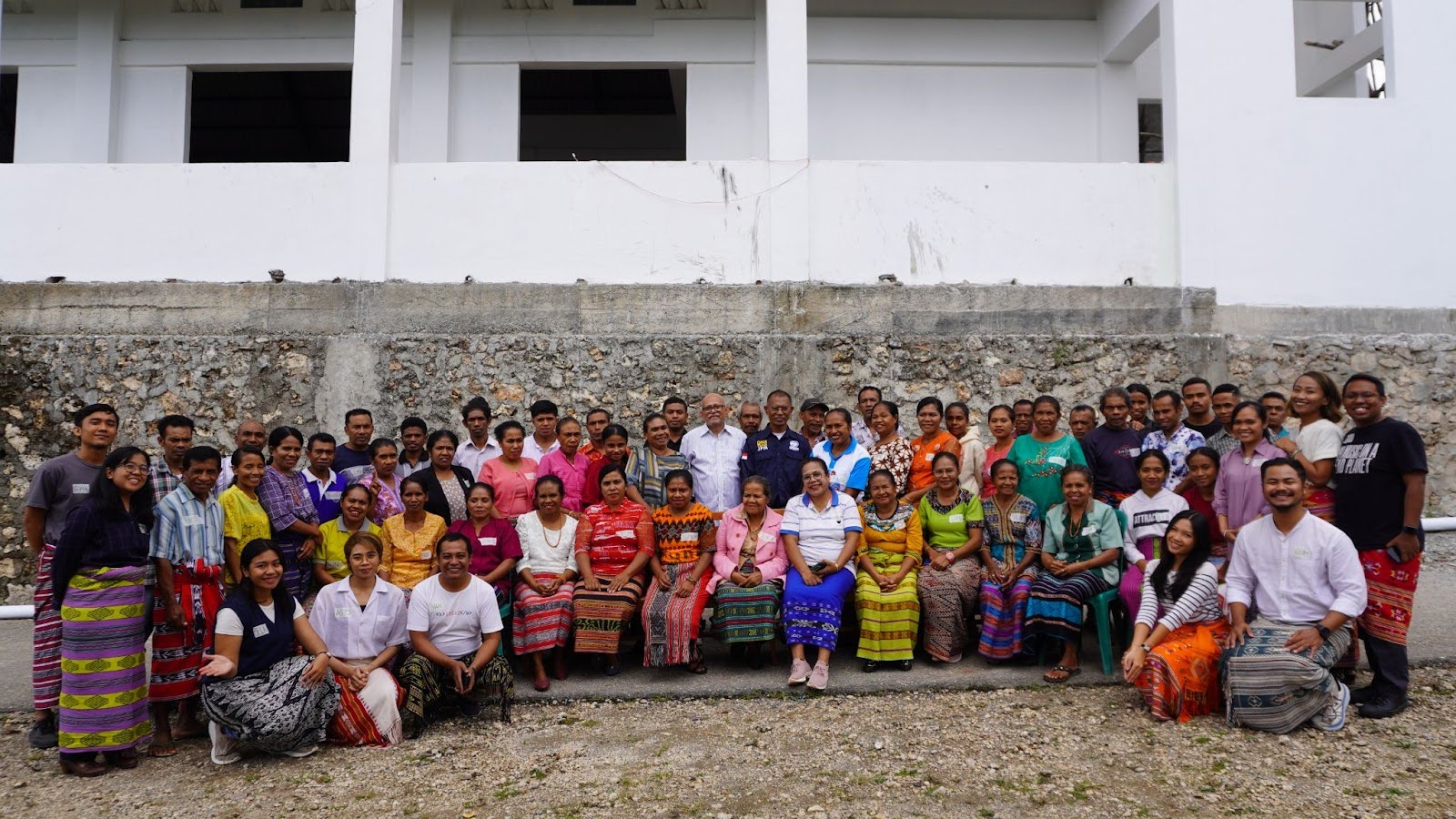
Ensuring food security is crucial for the well-being of communities and the healthy development of children. Food security means that households have access to sufficient, safe, and nutritious food that is distributed equitably and is affordable. When households face food insecurity, they often struggle to access essential nutrients, which can negatively impact the daily intake and growth of young children. This issue remains significant in Indonesia, with East Nusa Tenggara (NTT) reporting the highest prevalence of moderate or severe food insecurity according to the Central Statistics Agency (BPS) in 2023.
In response to this challenge, the PANGAN Initiative is making strides in the lush yet challenging landscapes of West Timor, East Nusa Tenggara. This innovative initiative by Kopernik, supported by the Institute of Food Technologists (IFT), seeks to transform the nutritional landscape for children during their first 1,000 days of life and their families. The initiative aims to produce highly nutritious and diverse local food, contributing to the national goal of reducing stunting prevalence and achieving food self-sufficiency, while supporting the broader aim of national food resilience.
Empowering Farmers through Knowledge and Skills
In early June 2024, a pivotal capacity-sharing activity took place in So’e, a subdistrict in West Timor, East Nusa Tenggara, where 50 farmers from the nearby villages of Noinbila, Nonohonis, and Biloto gathered. This three-day event was designed to equip farmers with crucial knowledge on climate change, food security in Timor, and innovative post-harvest technologies.
The farmers who participated in the capacity-sharing program.
One standout participant was 19-year-old Aris, a young farmer from Nonohonis. His enthusiasm was evident throughout the activity. Aris shared “Learning about climate change and new food technologies has opened my eyes to the possibilities of improving our farming practices and ensuring better nutrition for our community.” Aris's participation exemplifies the potential of youth in driving agricultural innovation and sustainability in their communities.
Aris shared his thoughts with other participants during the capacity-sharing session.
The event also featured practical cooking demonstrations by Marlinda Na’u, affectionately known as Mama Fun, a prominent local figure in So’e. She showcased innovative ways to transform local ingredients into nutritious and delicious meals.
The dishes prepared during the cooking session, utilizing locally sourced ingredients, showcasing the richness and nutritional value of the region's produce.
Introducing Solar Drying Technology
Like many farmers across Indonesia, those in So’e still rely on open-air drying methods, which expose crops to the elements. This method is vulnerable to unpredictable weather, pests, and animals, often resulting in inconsistent drying, hygiene issues, and a lengthy process that can take weeks.
To address these challenges, the PANGAN Initiative introduced solar dryers as a post-harvest innovation. This agricultural device efficiently dries crops, while protecting them from pests, thereby extending the shelf life of produce such as corn and sweet potatoes. Constructed from polycarbonate and wood, with a concrete and brick foundation, the solar dryer traps heat inside, allowing for efficient drying.
Mama Naomi’s house in Biloto village was selected as the site for this facility, benefiting the entire community. “We used to worry about our crops getting ruined by rain or pests. Now, with this solar dryer, they dry faster and stay safe. We can use them to make food for our families or sell them to earn a little extra income,” expressed Mama Naomi.
Mama Naomi stands in front of the solar dryer, holding corn that will be dried using the solar dryer.
Managing Organic Waste with Black Soldier Fly Larvae (BSF)
In addition to farming, many farmers in the region raise livestock for household protein needs and as a potential income source. However, the high cost of animal feed presents a significant challenge. The accumulation of organic waste and leftover harvests also poses waste management and environmental concerns.
To address these issues, the PANGAN Initiative introduced Black Soldier Fly (BSF) larvae, which can transform food and organic waste into nutritious feed for animals and compost for farming. Farmers can use the larvae as feed for their livestock or sell them to generate additional income. This initiative empowers the community economically and fosters environmentally sustainable growth.
The BSF facility is being set up at Bapak Elias's home in Nonohonis village. In this first phase, the team is testing whether the BSF larvae can survive, adapt, and complete their life cycle in So’e’s environment, as the project is still in the experimentation stage.
Bapak Elias holds BSF larvae from the first phase of the experiment.
Bapak Elias shared his hopes for the project, “We look forward to seeing how BSF larvae can help us manage waste and feed our livestock. It is a new approach, and we are hopeful it will bring positive results for our farming efforts.”
Looking Ahead: The Future of PANGAN Initiative
As the PANGAN Initiative progresses, we are encouraged by the promising potential demonstrated in its early stages. The active involvement of young farmers like Aris, along with the dedication of community members such as Mama Naomi and Bapak Elias, highlights the initiative's strong community-driven approach.
The current focus is on implementing a follow-up plan that includes establishing community gardens to apply regenerative agriculture practices. With promising results from the solar dryer experiments, the team will expand testing to process a wider range of commodities, including staple foods, spices, fruits, and vegetables. This will be followed by market testing to assess the viability of these dried products. For the Black Soldier Fly (BSF) project, the next phase will explore using BSF larvae as livestock feed to evaluate its potential for reducing feed costs.
Stay tuned for more updates on the PANGAN Initiative as it continues to evolve and bring positive changes to West Timor. Although the journey has just begun, the impact is already noticeable.


